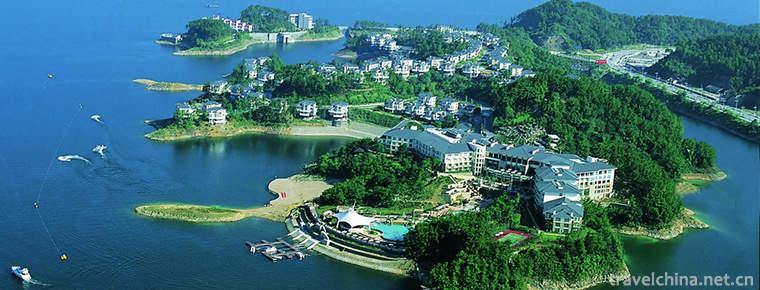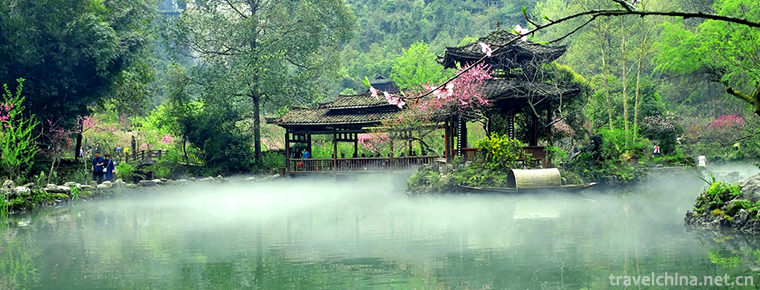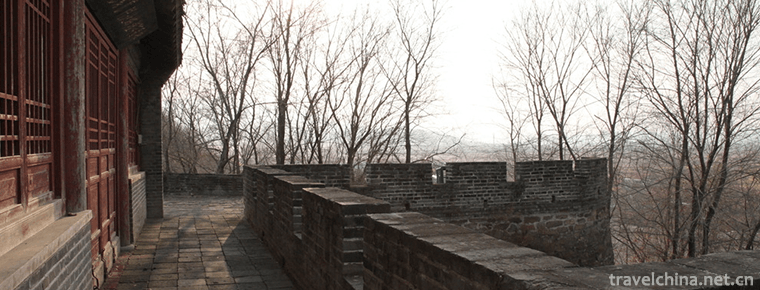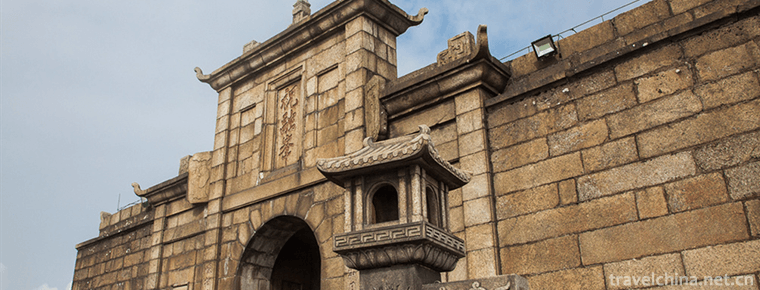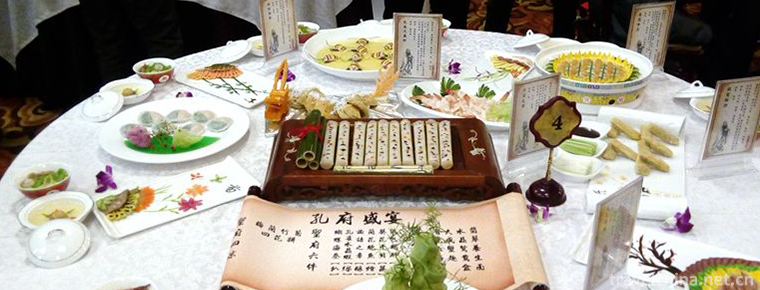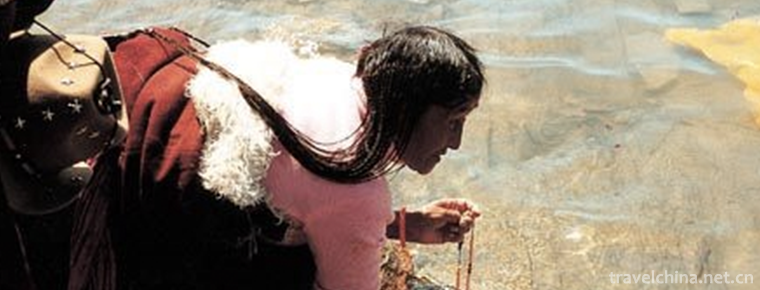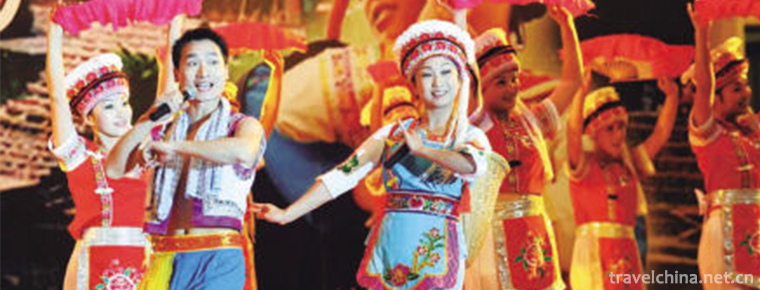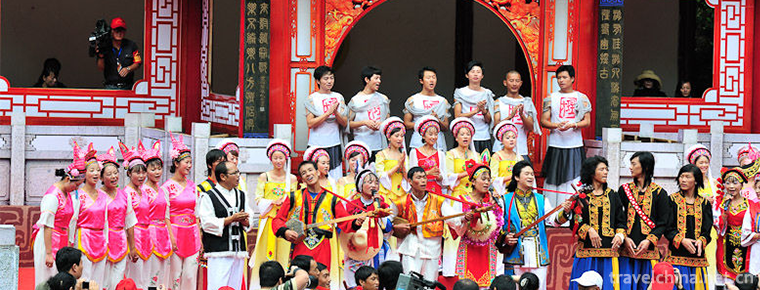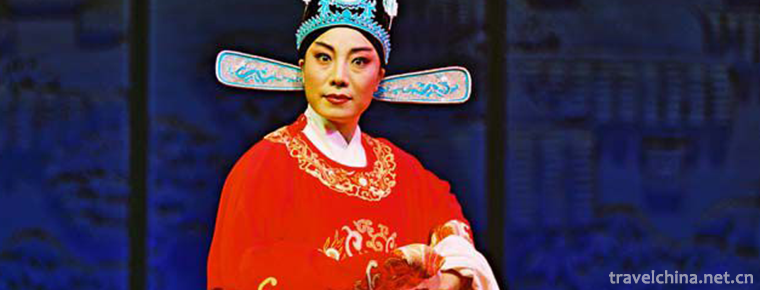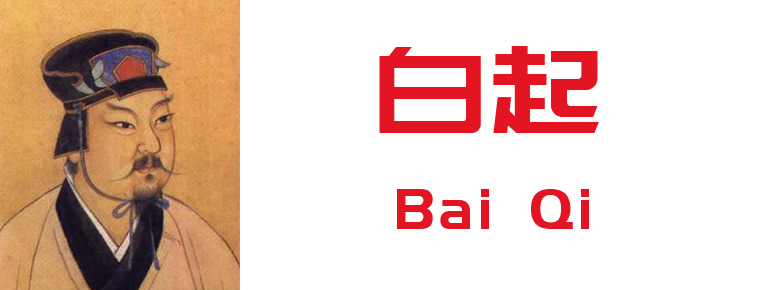Legend of Zhuangzi
Legend of Zhuangzi
The legend of Zhuangzi is a folklore of Dongming in Shandong Province. Chuang Tzu, Ming Zhou, Zixiu. According to the Records of History, it is recorded as the Mongolian people in the Warring States Period. It is a famous thinker, philosopher and writer in ancient China. It is a representative figure of Taoist school, a successor and developer of Laozi's philosophical thought, and a founder of Zhuangzi school in the pre-Qin period. One of the seven sons of the Pre-Qin Dynasty. Laozi and Laozi are called Laozhuang. Zhuangzi Legend is the third batch of national intangible cultural heritage list recommended projects, including Dongming County, Shandong Province, Zhuangzi Legend and other projects.
On May 23, 2011, Zhuangzi Legend was approved by the State Council to be included in the third batch of national intangible cultural heritage list.
Historical Origin
During the Warring States Period, the story of Chuang Tzu began to circulate. At the beginning of the Han Dynasty, the thought of Huang Lao, which was beneficial to recuperation and health, was popular, and the legend of Zhuangzi spread widely. During the Wei and Jin Dynasties, Taoism was very popular, and Zhuangzi was listed as the first book of "Three Metaphysics". In the Tang Dynasty, the emphasis on Chuang Tzu's thought led to the emergence of Taoism's emphasis on metaphysics, and the imperial edict was issued by Emperor Xuanzong of the Tang Dynasty. Chuang Tzu was named "the real man of South China", and Chuang Tzu was named "the True Sutra of South China".
Chuang Tzu was born in the aristocracy of the Song Dynasty. He read a lot at a very young time. "His learning is full of insights." As adults, family morality declined and became common people. He once worked as a junior official in the management of lacquer gardens. This job gave him an opportunity to contact the lower-class handicraft workers and to understand the folk craftsmanship, which triggered many of his philosophical thoughts about society and life. However, Chuang Tzu's character did not adapt to the work of "greeting the officers and whipping the common people". He soon resigned and retired to Nanhua Mountain, where he lived a poor life. Sometimes they depend on straw shoes and fishing to make a living. They are hungry, yellowish and thin. The so-called "living in poverty in Lane, weaving in distress, Huanxiang Huangqi" ("Zhuangzi Leyukou"). Although Chuang Tzu was poor, he despised fame and wealth. King Chu Wei paid him a lot of money to be his prime minister. He refused to accept his words. King Qi, with Zhuangzhou Xian, also wanted to hire him as the prime minister, but he likened the phase to that of a cow. Some other princes employed him as an official, and all of them were rejected by him. This is how Chuang Tzu is willing to be poor, not to admire honor and nobility, to live in poverty and happiness, to be simple and honest, to write books and make comments, and to communicate with the spirit of heaven and earth alone.
Legendary Content
Zhuangxian Sami
Legend has it that Zhuangzi was often around the Jade Emperor after ascending the Yunqiao to immortality, and was very important. One winter, after visiting the world, Zhuangxian reported to the Jade Emperor, "Many people died of hunger because of lack of food in the world, and the situation is very tragic. Although they are immortals, but there is nothing they can do. People have no food to eat, they can not bring anything for the immortals, and they also return to the heavenly palace empty stomach. The Jade Emperor was very sympathetic, so he said to Chuang Tzu, "You take rice seeds to the world and scatter them one step at a time."
Zhuangxian ordered Tiangong to take rice seeds, take a step and scatter a handful. In spring, the ground was covered with green rice. Since then, there has been rice in the world.
Among Zhuangziguan's offerings, besides steamed bread and fruit, a bowl of white rice was added.
Zhuangzi advised rain
In Yuzhou Tun Village, southwest of Dongming County, there is a bridge to climb Yun. It is said that Zhuangzi is the place where Zhuangzi ascends to immortality. After Chuang Tzu ascended to immortality, he was in charge of people's life and death, fame and fortune, good deeds and good deeds. He often talked with other immortals about heaven and earth, about the past and the present, and was at ease.
Dengyun Bridge, among the local people, is a place of visibility. One day, a drunken man came home and passed Dengyun Bridge. He stood at the head of Dengyun Bridge and urinated. He happened to be seen by the touring Dragon King of the East China Sea. He was furious. He consulted with the Dragon King of the five lakes and all over the world to stop raining in this place for three years. To dry up a fire in this area and destroy the land.
As a result, the area of Dengyun Bridge has been dry and rainless for a long time, and the sun is burning like fire. Half of the crops died of drought. The common people went to Zhuangziguan to burn incense, offer sacrifices and ask for rain. When Chuang Tzu knew this, he went to the Dragon King of the East China Sea to find out the situation. The Dragon King of the East China Sea said angrily, "You have done a lot of good in the area, but they do not respect you so much. They must do it strictly in the place where you ascend to immortality. Chuang Tzu said, "If you want to punish a person who has made a mistake, you can't let a piece of common people suffer from a seedling. Or do you want to do everything for the people, do good and accumulate virtue." When the Dragon King of the East China Sea listened, he ordered the Dragon Son to rain for the people in this area and relieve the people of the suffering of drought, that is, it rained in the drunken land where no urination was given.
From then on, Yuzhou Tuncun has a saying that "the bridge does not urinate, the bridge does not dump".
Zhuangzhou's Wife Testing (I)
Legend has it that Zhuangzhou lived in seclusion in Nanhua Mountain for eighteen years and practiced diligently. He finally achieved good results and attained immortality. But his heart is not pure, whenever he practices in quiet dust, he inevitably sprouts homesickness. When his master and son see his homesickness, they allow him to return home.
One day in the early spring, the wind and sunshine were beautiful, and Zhuangzhou returned to his hometown like an arrow, accompanied by gusts of breeze, unconsciously returning to Zhuangzhai village. Chuang Tzu thought to himself, "My wife, Yuniang, has been at home alone for eighteen years without any change of heart."
As Zhuangzhou was walking, he suddenly saw a young woman kneeling down beside the road and looking at the spring water. She fanned something with a fan. He was curious and asked, "Young woman, what are you fanning with a fan?" This is a spring of return. My husband has been away from home for many years. I heard that my husband would come back if the spring water was fan-dried. After listening to Zhuangzhou, it was even more strange that an ordinary woman could fan the spring water dry. I'd better give her a hand. Chuang Zhou-shen offered a courtesy and said, "Young woman, can I help you fan it?" The young lady saw an elder with fairy wind and bones coming in front of her. She handed the fan over. Zhuangzhou took the fan and fanned the return spring three times. The spring really dried up. The young woman was so surprised that she said, "Ah, with the help of fairies, my husband will come back. At this time, Chuang Chou-cai saw that the young woman was his wife, Zhou Yuniang. Chuang Chou was shocked, but she was even more shocked. They opened their arms and embraced each other tightly.
When both husband and wife returned home, Zhuangzhou could not help doubting that when I left home, there were three grass houses. How could the building and tile house change? It was not helped secretly by someone. How could a weak woman change her family? He thought about it and decided to try his wife Yuniang's heart.
After dinner, Zhuangzhou went to bed to rest, and Yuniang set up a spinning machine to spin the thread in front of the bed. After a while, a cool breeze blew out of the house and lifted the quilt off Zhuangzhou's body to the ground. The jade lady hastily covered the quilt on Zhuangzhou's body. However, she saw that Zhuangzhou's heart and feet were cold and his mouth and nose were endless, and she went to heaven unexpectedly. The Jade Mother cried for heaven and earth, grieved and lamented her destiny. After 18 years of solitary residence, she could hardly wait for her husband to come back and die in less than a day. My God? My life is so bitter! I might as well die. Then a white-faced scholar came to the room and did not wait for the mother to open her mouth. The scholar introduced himself: "I am a disciple of Mr. Sun Huaizhou, whose name is Sun Huaizhou, and I invite my mother and teacher to pay a visit to the late pupils." At this time, the jade lady was still crying bitterly, and she did not listen to the scholar's words at all. The scholar went on to say, "Mother and teacher, people are dead and crying is useless. It's important to handle the aftermath at the moment." At that time, Yuniangfang stopped crying and invited the villagers to put Chuang Zhou to death.
Three days after the funeral, Sun Huaizhou was diligent in handling Master's aftermath affairs. That evening, Sun Huaizhou chatted with his mother and teacher in his room, talking with them and showing his utmost concern. Suddenly, Sun Huaizhou gave a tragic cry and fell unconscious on the ground. At this time, the mother was shocked! What a good disciple! For the sake of Master, he died of exhaustion and sickness. Suddenly, the teardrop of the Jade Maiden was vertical and horizontal. She held her disciples with both hands. She cried and cried. The teardrop finally dried up. Maybe the Jade Maiden was too tired. She fell asleep with Sun Huaizhou in her arms.
When she woke up, she did not see her disciple Huaizhou, but saw her husband lying in her arms. At this time, she was ashamed, pushed him up, went into the room, pulled up three feet of white damask, and lost her life.
When Zhuangzhou saw his wife's death, instead of crying, he rapped on the earthen pot and sang.
I will bury you when you die.
You will marry me when I die.
If I really die,
A big joke.
Chuang Chou sang and burst into laughter, smashing the earthen pot. Suddenly, thunder broke out in the laughter, and a yellow silk floated down from the sky with four inscriptions on it:
Zhuangzhou Opera Wife,
It's against nature.
Penalty is half an immortal.
No God.
Zhuangzhou's Wife Testing (2)
On his way home once, Zhuangzhou passed a new grave, in front of which a woman in filial piety was fanning the grave. Chuang Tzu was curious and asked the woman, "Why fan the grave with a fan?" The woman said, "My husband was buried in the grave. My husband and I loved each other very much before we died, so he was very reluctant to give up me when he died. He said to me that if he died, I could remarry, but don't be too quick, wait for the soil on his grave to dry up and remarry. Now, the soil of this grave dries too slowly. My boyfriend and I can't wait. In order not to break the oath, we fan the grave with a fan. I hope the grave dries quickly. After hearing this, Zhuangzhou was greatly impressed by the terrible change of heart, but he also sympathized with the poor woman, so he applied magic to dry the soil on the grave. When I got home, I told my wife what happened on the way, Tian Shi, and sighed, "Women are the same. When I die, you will soon remarry." Tian was so angry that he scolded Zhuangzhou and swore that he would love him for nothing. Later, Zhuangzhou became ill, and the more serious the disease became, he told Tian on his deathbed that she could remarry. Tian also vowed by heaven that he would love Chuang Tzu till death and never remarry.
This story shows that the original love between husband and wife, the result of rapid change in the hearts and minds. After death, we should fan the grave with a fan, so that we can remarry earlier. This is a satirical story. It is intended to remind you that there must be a beginning and an end.
Finally, Zhuangzhou died, and Tian sadly collected Zhuangzhou and parked the coffin in the house. One day, it was the seventh day of Zhuangzhou's reign that a prince named Wang Sun of Chu, who claimed to be a student of Zhuangzi, came to mourn Zhuangzi. Sun, the king of Chu, was very handsome. Before he knew it, Tian fell in love with him. They fell in love with each other and decided to combine. But Chuang Tzu's Qiqi had not passed yet. Suddenly one day, King Sun of Chu became ill, and more and more serious. Tian urgently asked the doctor to see him. The doctor said that King Sun of Chu's disease should be treated with human brain, otherwise he would not live long. Where can I find a brain to eat for King Sun of Chu? Tian was very sad, and suddenly thought of Zhuangzhou, who was stopped in the coffin. So, Tian took the axe and split the coffin, ready to take Zhuangzhou's brain to eat for the King and Sun of Chu. Unexpectedly, several axes were chopped down. After the coffin was split, Zhuangzhou actually came back to life. Originally, this was Zhuangzhou's use of magic to try his wife. The King and Sun of Chu was Zhuangzhou's change. Tian was so ashamed and angry that he committed suicide.
Because this legend hinders Zhuangzi's image, Zhuangzhai Village in Dongming County has not been allowed to perform the play "Splitting the Coffin and Shocking the Dream".
The Origin of Nanhua Mountain, Wanju and Wubagang
According to legend, there used to be Jishui, Pushui and lacquer water in the Dongming area of Caozhou. They often overflowed and caused disasters. Houses collapsed, cattle and sheep ran away, crops drowned, and the people cried bitterly. This event alarmed the Jade Emperor, and the Jade Emperor ordered the mountain gods to set up several mountains in this place to block the flood and protect one side of the people.
Who knows that the news was leaked by a fairy, who unintentionally leaked the secret, and the tiger ran to a place where the mountain was going to be king; a dragon knew that, and ran to a place where the mountain was going to rise to occupy the site; and a phoenix knew that, and first came to a place where the mountain was going to occupy the site.
The Mountain God arranged the mountain to rise and see how tigers, dragons and phoenixes came ahead of time. So it was reported that the Jade Emperor could not speak of mountains. The tiger waited there for a few days, did not see the mountain, starved to death there, people called this place hungry tiger prison. Up to now, there is still a seven-mu ridge, eight-mu platform and Tongguji; the area occupied by the dragon has not risen, but there has been a heap, which people call Longshan, and later became a market town, which is now the Longshan Collection of Datun Township, Dongming County; the Phoenix flew away without rising the mountain, leaving a small phoenix, called Yuyu. During the Han Dynasty, this local county was called Wanju County.
There are still 500 hills in the middle. They are called Wubaigang. Later, because the princes of Qihuan Guild were here, they were also called Wubagang (now Wubagang Village, Luhuan Town, Dongming County). There is also a dump in the north, because in the north of Nanhua Valley, it is called Nanhua Mountain.
After Chuang Tzu retired, he came to Nanhua Mountain with Pushui in the north and lacquer in the south, and built a grass house to hide.
Easy Travel
Xiaoyaoyou is the first chapter of Zhuangzi, which can be regarded as the representative of Zhuangzi both ideologically and artistically. The theme of Happy Journey is to pursue an absolutely free outlook on life. The author believes that only by forgetting the boundaries between things and me, reaching the realm of selflessness, uselessness and namelessness, and swimming in the infinite without any support, can we truly "Happy Journey". The article first expounds the difference between "small" and "big" by comparing Dapeng with other small animals such as Yue and Xueyu. On this basis, the author points out that, whether it is a poor flying Yue and Xueyu, or a great ROC that can fly up to 90,000 miles in the sky by the wind, or even a member who can resist the wind, they are "waiting" but not "waiting". Free, which leads to and elaborates the principle of "to the person without himself, God without merit, sage without name". At the end of the article, through the debate between Huizi and Chuang Tzu about "usefulness" and "uselessness", it shows that only when they are not used by the world can they be "free". The full text is rich in imagination, novel in conception, grotesque in grandeur, Wang Yang Wang Wang Wang Wang Wang Wang Wang Wang Wang wang, filled with the spirit of romanticism between the lines.
Inheritance Significance
Zhuangzi's legends and stories embody the characteristics of mystery, broad-mindedness, humor, simplicity, innocence, harmony and beauty. Let people see a vivid character image of "making fools with great wisdom, conforming to nature, maintaining their true colors and being indifferent to fame and fortune", which reflects the Taoist thought of "doing nothing but doing something well", following the example of the world and respecting the law of nature in governing the country. These views still have infinite vitality up to now.
Zhuangzi Legend and other seven projects were included in provincial non-heritage sites.
Zhuangzi legend, Mengcheng ballad, Chen Luzu's six-in-one eight-way boxing, traditional brewing skills of blast furnace family, Lujiasheng production skills, Huaibei Bangzi opera, Huaibei drum and other seven traditional projects with Bozhou characteristics were included in the fourth batch of provincial intangible cultural heritage in our province, ranking third in the province.

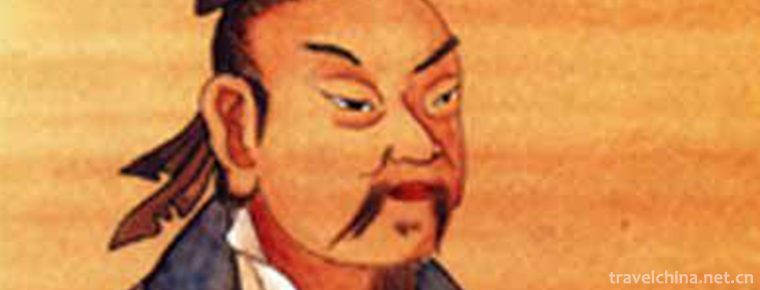
-
Thousand Islet Lake Qiandaohu Scenic Area
Qiandaohu Scenic Area, also known as Xin'anjiang Reservoir, is located in Chun'an County, Hangzhou City, Zhejiang Province..
Views: 190 Time 2018-12-07 -
Youyang Peach Blossom Source Tourist Scenic Area
Taohuayuan Scenic Spot is located in the suburbs of Youyang County, which is known as the "Liangdu of Chongqing". It is a national AAAAA-level tourist attraction.
Views: 268 Time 2018-12-12 -
The ancient city of Hetuala
The ancient city of Hetuala is located in Yongling Town, Xinbin Manchu Autonomous County, Liaoning Province. It is 5 kilometers west of Qingyongling.
Views: 209 Time 2019-01-13 -
Hengshan Scenic Area
Hengshan Scenic Area, located in Nanyue District of Hengyang City, is a holy place of Quanzhen sect, the mainstream Taoist religion, with an elevation of 1300.2 meters. Because the climate conditions .
Views: 144 Time 2019-01-16 -
Cooking Skills of Confucian Cuisine
The cooking skill of Confucian cuisine, the traditional handicraft of Qufu City, Shandong Province, is one of the national intangible cultural heritages..
Views: 97 Time 2019-05-09 -
Qinghai Lake offering sacrifices to the sea
Qinghai Lake is a pearl on the plateau of the mangyang snow area, which has been admired by people for thousands of years. This paper systematically expounds the origin, course.
Views: 194 Time 2019-06-10 -
Sangzhi Folk Song
Sangzhi folk song originated from the ballads of the ancestors'daily production and life in the primitive farming period. It is a kind of folk music culture created, Sung and accumulated by the people.
Views: 129 Time 2019-06-12 -
Shibao Mountain Song Club
The Bai Jianchuan Shibao Mountain Song Festival is held every year from 27 to 29 July of the lunar calendar for three days. At this time, tens of thousands of young Bai men and women and singers from .
Views: 182 Time 2019-06-15 -
Bangkok in Xuzhou
Xuzhou Bangzi, one of the traditional local operas in Jiangsu Province, is named for its rhythm, which is directed by a set of drums and bangzi. The masses of Xuzhou also call it "Grand Opera&quo.
Views: 108 Time 2019-07-09 -
The Decorative Techniques of Yi Lacquerware
Yis lacquerware decoration technology chooses high-quality azalea, acid wood, camphor wood as raw materials, through sawing, planer, grinding, sticking and other processes, and then carefully paint th.
Views: 370 Time 2019-07-12 -
Bai Qi
White(Bai Qi)(? - 257 BC). He is a man in the village of Bai village, Chang Xing Town, Mei County, Shaanxi today. Outstanding military strategist and representative of "military strategist" .
Views: 131 Time 2019-09-11 -
Anhui University of Finance and Economics
As a multi-disciplinary finance and economics university, economics, management and law are the first batch of universities that have the right to grant bachelor's degree and the third batch of granti.
Views: 186 Time 2019-09-30
